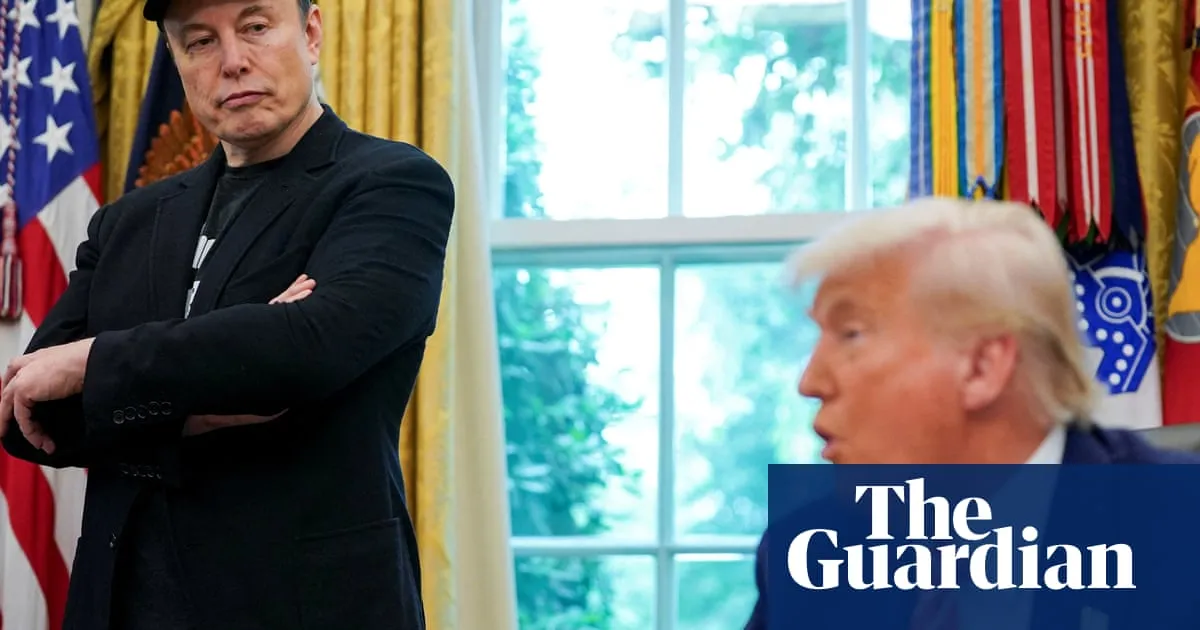
In February, tech mogul Elon Musk expressed his admiration for former President Donald Trump, stating, “I love @realDonaldTrump as much as a straight man can love another man,” in a post on X. Musk reminisced about his numerous sleepovers at the White House, where he indulged in late-night snacks like caramel Häagen-Dazs ice cream, all at Trump's suggestion. However, the complexities of their relationship became evident earlier this week when Musk publicly criticized Trump's major tax and spending legislation, labeling it a “disgusting abomination.”
Despite their previous camaraderie, this rift seemed inevitable. Trump responded by expressing his disappointment in Musk, threatening to cut government contracts for Musk's companies, and even mocking Musk for refusing makeup during a visit to the Oval Office post-injury. Musk did not hold back, accusing Trump of lying, suggesting he should be impeached, and even hinting at forming a new political party. The tensions escalated further when Musk alleged that Trump was mentioned in the Epstein files, showcasing a dramatic fall from grace reminiscent of a tumultuous Hollywood drama.
As the fallout continues, Musk claims his criticism stems from a commitment to fiscal responsibility. For insights into this chaotic political landscape, I spoke with Hugo Lowell, the Guardian’s White House correspondent, who suggested there may be deeper motives behind Musk’s public outburst.
Scotland: Scottish Labour is celebrating a significant win in a pivotal Holyrood byelection, defeating the incumbent SNP and pushing back against Reform UK’s controversial campaigning. This unexpected result is poised to strengthen Labour ahead of the upcoming Scottish parliamentary elections.
Ukraine: Russia launched an intense barrage against Kyiv overnight, deploying missiles and drones that resulted in multiple explosions in the Ukrainian capital. This attack follows Russia’s vow to retaliate against Ukraine after a drone strike targeted its bomber fleet.
Reform UK: Zia Yusuf, the chair of Reform UK, has stepped down after criticizing a party MP for questioning the Prime Minister about banning the burqa. His resignation poses a challenge for Nigel Farage as he attempts to professionalize the rapidly growing party.
Water Industry: In response to serious sewage pollution, the Labour government has enacted immediate bans on bonuses for ten water company executives in England, including Thames Water’s CEO.
Technology: Amazon is reportedly developing innovative software for humanoid robots, aimed at performing delivery tasks. This initiative includes the creation of a “humanoid park” in the U.S. for robotic testing.
Musk’s sharp critique of Trump’s “big, beautiful bill”—a comprehensive legislative package that extends tax cuts and cuts social safety nets, primarily benefiting the wealthy—reveals a significant shift in their relationship. Analysis indicates that this bill could potentially increase the U.S. deficit by an astonishing $2.4 trillion over the next decade. Musk, feeling liberated since leaving government service, expressed outrage over a package that he believes would turn Americans into "debt slaves."
Lowell noted that Musk’s discontent with Trump had been brewing for some time, especially following an incident in March where Musk organized private briefings on Pentagon strategies regarding China without White House approval. This breach of trust changed the dynamics of their relationship, with Trump feeling undermined and concerned about Musk’s growing influence and his own control over the situation.
Initially, Musk’s public anger was directed at the “big, beautiful bill,” which he described as a “disgusting abomination.” He claimed that the bill undermined his own efforts at fiscal management, positioning himself as a defender of responsible spending. Despite his strong rhetoric, it seems there may be more personal reasons behind his attack.
Beyond Musk's broader ideological concerns, there was a specific provision in the legislation that eliminated a $7,500 electric vehicle tax credit, crucial for Tesla sales. Musk’s outrage over this change, coupled with the declining performance of Tesla shares, highlights the self-serving nature of his criticisms. As Tesla's share price fell by 14%, wiping out $152 billion in value, Musk's motivations appear to intertwine personal stakes with public policy critiques.
As the story unfolds, the political implications of Musk’s intervention cannot be understated. His comments have the potential to influence Republican senators’ stances on the bill, particularly with fiscal conservatives like Ron Johnson advocating for a more restrained version. However, there's skepticism surrounding Musk’s commitment to a balanced budget, given his previous support for Democrats and his self-serving history.
Despite this, Musk hinted at funding primary challenges against Republicans who support the bill, suggesting a desire for political influence. While some speculate whether he will follow through, the implications of his allegations, particularly regarding the Epstein files, could harm Trump’s public perception.
As the drama between Musk and Trump unfolds, it's clear that their relationship, once characterized by camaraderie, has descended into a chaotic spectacle filled with accusations and political maneuvering. The future of their interactions remains uncertain, but the stakes are undeniably high for both parties involved.
In conclusion, the ongoing discord between Elon Musk and Donald Trump exemplifies the unpredictable nature of politics, especially when billionaire interests collide. As this story develops, it will be interesting to observe how their rivalry influences both their personal brands and the broader political landscape.